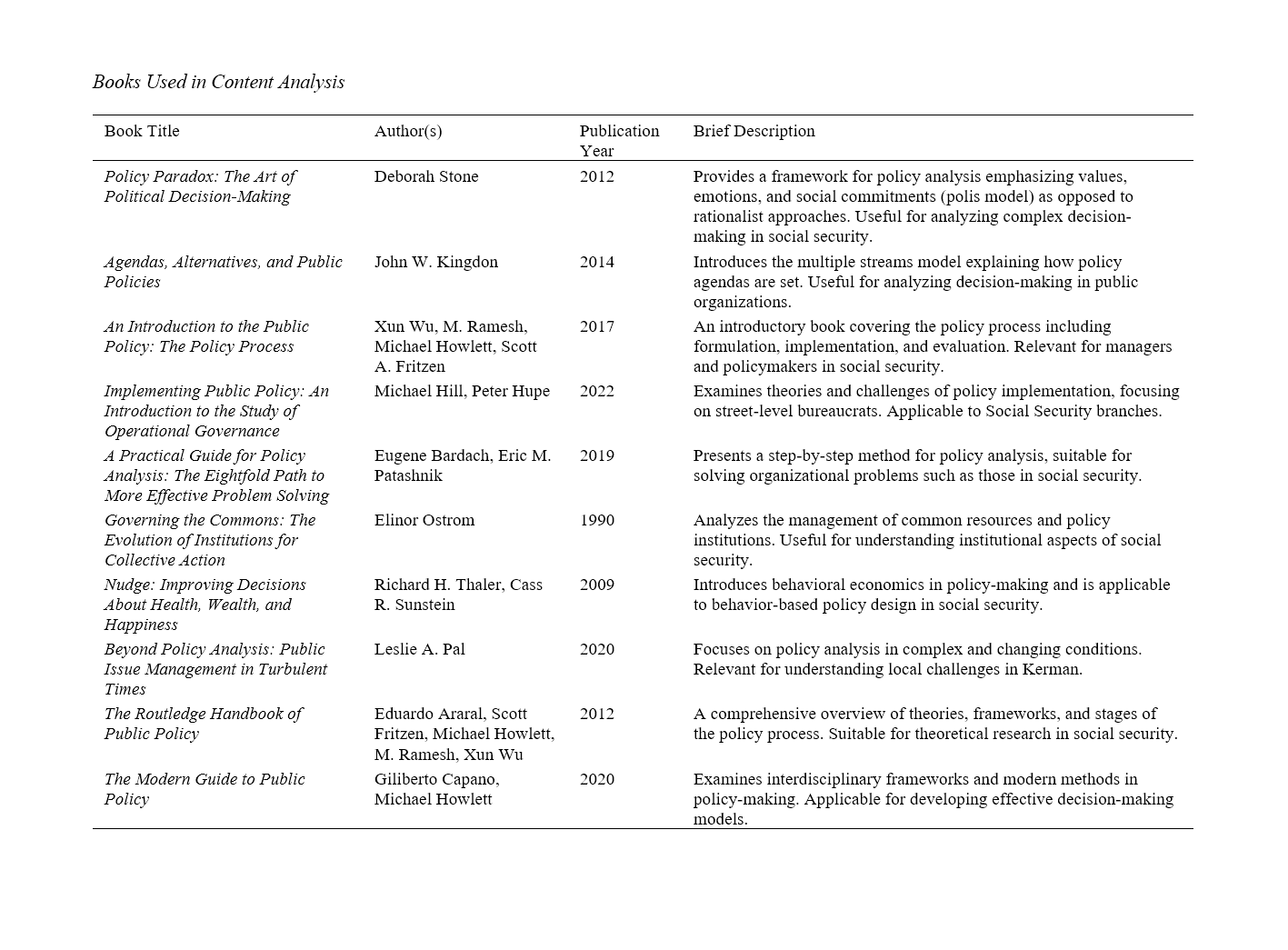Identifying the Dimensions of Effective Decision-Making Based on Public Policy-Making Models in the Social Security Organization of Kerman
Keywords:
Effective decision-making, public policy-making, social security, analytical rationality, participatory network.Abstract
The aim of this study was to identify the dimensions of effective decision-making based on public policy-making models in the Social Security Organization of Kerman. This research was applied in terms of objective and used a mixed-methods design (qualitative and quantitative). In the qualitative section, inductive content analysis was conducted by reviewing ten academic management books that addressed public policy-making models such as rational, cyclical, institutional, network-based, participatory, evidence-based, top-down, bottom-up, cultural-structural, learning, stakeholder analysis, and good governance. The components and indicators of these models were identified and extracted. In the quantitative section, exploratory factor analysis was performed using questionnaire data collected from 300 employees and managers of Social Security branches, based on a 48-item Likert-scale questionnaire. Five main factors were extracted: analytical rationality, participatory network, institutional framework, executive management, and organizational learning. These factors explained 72.05% of the variance in the data. The adequacy of the data was confirmed by the KMO test result of 0.82 and Bartlett's test of sphericity (χ² = 5241.36, df = 1128). The findings indicated that these factors offer a comprehensive framework for effective decision-making that can enhance branch coordination, stakeholder engagement, legal compliance, effective policy implementation, and continuous improvement. It is recommended that future research apply confirmatory factor analysis and the Delphi method to validate the proposed model.
References
Askari Bagherabadi, M., Khanmohammadi, H., & Hosseinpour, D. (2024). Identifying and Prioritizing Wicked Problems in Iran's Administrative System. Public Service Management Studies, 2(3), 1-44. https://spsa.atu.ac.ir/article_17131.html?lang=en
Bardach, E., & Patashnik, E. M. (2019). A practical guide for policy analysis: The eightfold path to more effective problem solving. CQ Press. https://justicepolicynetwork.com/wp-content/uploads/2021/03/Bardachs-Eightfold-Path-1.pdf
Cairney, P. (2019). Understanding public policy: Theories and issues. Red Globe Press. https://paulcairney.wordpress.com/wp-content/uploads/2020/01/cairney-2nd-proof-combined.pdf
Elareshi, M., Habes, M., Ali, S., & Attar, R. W. (2024). Public Engagement Through Public Service Advertisements for Health Care Awareness During Early COVID-19 in Pakistan. Frontiers in Communication, 9. https://doi.org/10.3389/fcomm.2024.1376717
Fadaei, M., & Nargesian, A. (2023). A public policy-making model based on the behavioral economics approach using meta-synthesis method. Public Policy Making in Management Journal, 52(1), 101-119. https://srb.sanad.iau.ir/en/Article/790933
Farazmand, A. (2009). Bureaucracy and administration. CRC Press. https://doi.org/10.1201/NOE0824723699
Hill, M., & Hupe, P. (2022). Implementing public policy. SAGE Publications. https://www.ippapublicpolicy.org/book/implementing-public-policy-an-introduction-to-the-study-of-operational-governance-4th-ed/45
Hosseini, R., & Nazifi, R. (2023). Investigating and explaining the optimal policy-making model for the management system in organizational decision-making of the Red Crescent Society. Journal of Government Organizations Management, 45(2), 90-108. https://civilica.com/doc/1955871/
Howlett, M., & Ramesh, M. (2003). Studying public policy: Policy cycles and policy subsystems. Oxford University Press. https://global.oup.com/academic/product/studying-public-policy-9780199026142
Kaufmann, D., Kraay, A., & Mastruzzi, M. (2010). The worldwide governance indicators: Methodology and analytical issues. World Bank. https://doi.org/10.1596/1813-9450-5430
Mousavi, A., Karimi, H., & Dehghan, A. (2021). Analysis of bureaucratic challenges in service organizations: A case study of Kerman Social Security branches. Quarterly Journal of Public Policy Research, 10(3), 45-67.
Peters, B. G. (2015). Advanced introduction to public policy. Edward Elgar Publishing. https://www.e-elgar.com/shop/gbp/advanced-introduction-to-public-policy-9781789908282.html?srsltid=AfmBOorE7uC9w3qiNBofanQZ8Mu6fXRCf-OrjX8P1GqJcBvLOkzSLP3C
Sabatier, P. A. (1986). Top-down and bottom-up approaches to implementation research. Journal of Public Policy, 6(1), 21-48. https://doi.org/10.1017/S0143814X00003846
Sabatier, P. A., & Weible, C. M. (2014). Theories of the policy process. Westview Press. https://www.taylorfrancis.com/books/edit/10.4324/9780429494284/theories-policy-process-christopher-weible-paul-sabatier
Shojaei, H., Salajegheh, S., Mahdizadeh, S., & Manzari Tavakoli, A. (2022). Designing a model for sustainable social development based on cultural policies of governmental organizations to ensure civil rights (Case study: Kerman City). Iranian Political Sociology Journal, 27(2), 5986-6004. https://jou.spsiran.ir/article_157444.html?lang=en
Sulistiyo, H. (2024). Dimension of Smart Governance in Supporting Public Services in Madiun City, East Java Province. Jurnal Politik Pemerintahan Dharma Praja, 17(2), 47-58. https://doi.org/10.33701/jppdp.v17i2.4812
Taheri Janbazlou, H. (2022). Policy instruments and their position in making public policy implementable. Rahyaft-e Andisheh Journal(101), 270-275.

Downloads
Published
Submitted
Revised
Accepted
Issue
Section
License
Copyright (c) 2025 Zahra Negari (Author); Abbas Babaeinejad; Alireza Sanatkhah, Soheila Shamsadini (Author)

This work is licensed under a Creative Commons Attribution-NonCommercial 4.0 International License.









